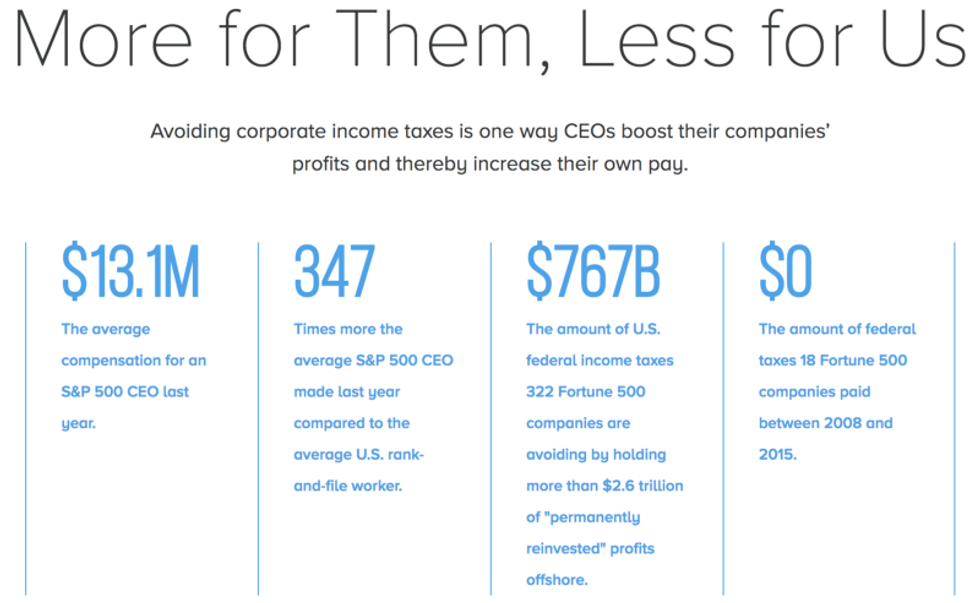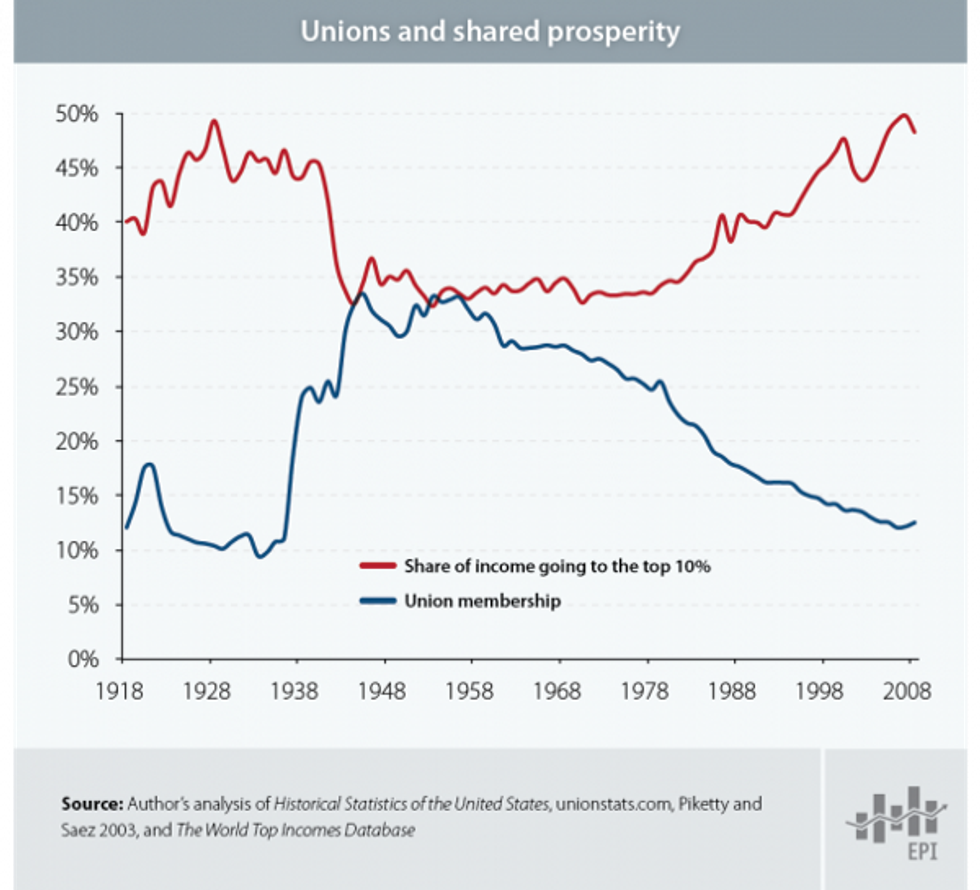Meanwhile, as the rich become much richer, the level of income and wealth inequality has reached obscene and unimaginable levels. In the United States, we have the most unequal level of wealth and income distribution of any major country on earth, and worse now than at any other time since the 1920s. Today, the top one-tenth of 1 percent of our nation owns almost as much wealth as the bottom 90 percent, and one family owns more wealth than the bottom 42 percent. In terms of income, 99 percent of all new income is going to the top 1 percent.
This is what a rigged economic system looks like. At a time when millions of American workers have seen declines in their incomes and are working longer hours for lower wages, the wealth of the billionaire class is soaring in a way that few can imagine. If you can believe it, between 2013 and 2015, the 14 wealthiest individuals in the country saw their net worth increase by over $157 billion dollars. Children go hungry, veterans sleep out on the streets, senior citizens cannot afford their prescription drugs -- and 14 individuals saw a $157 billion dollar increase in their wealth over a two-year period.
The grotesque level of income and wealth inequality we are experiencing is not just a moral and economic issue, it is a political issue as well. As a result of the disastrous Citizens United Supreme Court decision, billionaires are now able to spend unlimited sums of money to buy the candidates they want. The Koch brothers, an extreme right-wing family, recently announced that they were prepared to spend some $900 million in the next election cycle. This is likely more money than either the Democratic or Republican parties will spend. If you think that it is an accident that the Republican Party has become a far-right party, think again. The Koch brothers' agenda -- ending Social Security, Medicare, Medicaid, the U.S. Postal Service, the Environmental Protection Agency and all campaign finance limitations -- has become the agenda of the Republican candidates they fund.
And, by the way, if you think that the Republican Party's refusal to acknowledge that climate change is real, is caused by human activity and is a severe threat to our planet, is not related to how we finance campaigns, you would be sorely mistaken. With the Koch brothers (who make much of their money in the fossil fuel industry) and big energy companies strongly supporting Republican candidates, it should not surprise anyone that my Republican colleagues reject the views of the overwhelming majority of scientists who study climate issues.
With Republicans now controlling both houses of Congress, let me briefly touch on some of the battles that I will be helping to lead in this extreme right-wing environment. In my view, with so many of our fellow citizens demoralized about the political process, it is absolutely imperative that we establish a strong progressive agenda that Americans can rally around. It must be an agenda that reflects the real needs of the working families of our country. It must be an agenda that engages people in a political struggle that they are prepared to fight for.
Jobs, Jobs, Jobs: The truth is that real unemployment in our country is not the "official" and widely-reported 5.5 percent. Counting those who are under-employed and those who have given up looking for work, real unemployment is 11 percent. Even more disturbingly, youth unemployment is close to 17 percent and African-American youth unemployment is much higher than that.
If we are truly serious about reversing the decline of the middle class and putting millions of people back to work, we need a major federal jobs program. There are a number of approaches which can be taken, but the fastest way to create jobs is to rebuild our crumbling infrastructure -- roads, bridges, dams, levees, airports, rail, water systems and wastewater plants.
In that regard, I have introduced legislation which would invest $1 trillion over 5 years to modernize our country's physical infrastructure. This legislation would create and maintain at least 13 million good-paying jobs. It would also make our country more productive, efficient and safe.
I will also continue my opposition to our current trade policies and vote against fast tracking the Trans-Pacific Partnership. Simply put, our trade policies have failed. Permanent normal trade relations with China have led to the loss of more than 3.2 million American jobs. The North American Free Trade Agreement has led to the loss of nearly 1 million jobs. The Korean Free Trade Agreement has led to the loss of some 60,000 jobs.
We have got to fundamentally rewrite our trade rules so that American jobs are no longer our No.1 export. Corporate America must start investing in this country, not China.
As we struggle for decent-paying jobs, we must also rebuild the trade union movement. Throughout the country, millions of workers want to join unions but are meeting fierce opposition from their employers. We need legislation that makes it easier, not harder, for unions to flourish.
Raising Wages: Today, millions of Americans are working for starvation wages. The current federal minimum wage of $7.25 an hour is totally inadequate. In fact, the real value of today's minimum wage has declined by one-third since 1968. By raising the minimum wage to a living wage we can provide an increase in income for those people who need it the most. Our goal must be that no full-time worker in this country lives in poverty.
We must also bring about pay equity. There is no rational reason why women should be earning 78 cents on the dollar compared to men who perform the same work.
Further, we have got to expand overtime protections for millions of workers. It is absurd that "supervisors" who earn $25,000 a year are currently forced to work 50 or 60 hours a week with no overtime pay. Raising the income threshold to at least $56,680 from the absurdly low level of $23,660 a year for overtime will mean increased income for many millions of salaried workers.
Addressing Wealth and Income Inequality: Today the richest 400 Americans own more than $2.3 trillion in wealth, more than the bottom 150 million Americans combined. Meanwhile, nearly half of Americans have less than $10,000 in savings and have no idea how they will be able to retire with dignity.
We need real tax reform which makes the rich and profitable corporations begin to pay their fair share of taxes. It is absurd that in 1952 corporate income taxes provided 32 percent of federal revenue while in 2014 they provided 11 percent. It is scandalous that major profitable corporations like General Electric, Verizon, Citigroup and JP Morgan have, in a given recent year, paid nothing in federal income taxes. It is fiscally irresponsible that the U.S. Treasury loses about $100 billion a year because corporations and the rich stash their profits in the Cayman Islands, Bermuda and other tax havens.
Warren Buffett is honest. He has pointed out the unfairness of him, a multi-billionaire, paying a lower effective tax rate than his secretary. It is disgraceful that millionaire hedge fund managers are able to pay lower tax effective tax rates than truck drivers or nurses because they take advantage of a variety of loopholes that their lobbyists wrote.
This must end. We need a tax system which is fair and progressive. Children should not go hungry in this country while profitable corporations and the wealthy avoid their tax responsibilities.
Reversing Climate Change: The United States must lead the world in reversing climate change and make certain that this planet is habitable for our children and grandchildren. We must transform our energy system away from fossil fuels and into energy efficiency and sustainable energies. Millions of homes and buildings need to be weatherized, our transportation system needs to be energy efficient and we need to greatly accelerate the progress we are already seeing in wind, solar, geothermal and other forms of sustainable energy. Transforming our energy system will not only protect the environment, it will create good-paying jobs.
Health Care for All: The United States remains the only major country on earth that does not guarantee health care for all as a right. Despite the modest gains of the Affordable Care Act, 35 million Americans continue to lack health insurance and many more are under-insured. Yet, we continue paying far more per capita for health care than any other nation. The United States must move toward a Medicare-for-All single-payer system.
Protecting Our Most Vulnerable: Today the United States has more people living in poverty than at almost any time in the modern history of our country. We have the highest rate of childhood poverty of any major nation, 35 million Americans still lack health insurance and millions of seniors and disabled people struggle to put food on the table because of insufficient Social Security benefits.
The Republican response to the economic pain of so many of our people was to make a bad situation much worse. The recently-passed Republican budget throws 27 million Americans off of health insurance, cuts Medicare, makes huge cuts to nutrition and makes it harder for working class families to afford college or put their kids in the Head Start program.
In my view, we have a moral responsibility to make certain that no American goes hungry or sleeps out on the streets. We must also make certain that seniors and people with disabilities can live in dignity. Not only must we vigorously oppose Republican attacks on the social safety net, we must expand benefits for those in need. That is why I have recently introduced legislation which would increase the solvency of Social Security until 2065, while expanding benefits for those who need them the most.
Making College Affordable for All: We live in a highly competitive global economy. If this country is to do well economically, we need to have the best-educated workforce in the world. Yet today many Americans cannot get a higher education, not because they are unqualified, but because they simply cannot afford it. Millions of others who do graduate from college or graduate school are drowning in debt. According to the Consumer Financial Protection Bureau, the total amount of outstanding student loan debt in the United States has tripled in the last 10 years, and has now reached $1.2 trillion.
The United States must join many other countries in understanding that investing in our young people's education is investing in the future of our nation. I will soon be introducing legislation to make tuition in public colleges and universities free, as well as substantially lower interest rates on student loans.
And these are just SOME of the issues we are dealing with.
Let me conclude this letter by stating the obvious. This country is in serious trouble. Our economic system benefits the rich and large corporations and leaves working families behind. Our political system is dominated by billionaire campaign contributors and their lobbyists and is moving us in the direction of oligarchy. Our media system, owned by the corporate world, spends enormous time and energy diverting our attention away from the most important issues facing us. Climate change threatens the planet and we have a major political party denying its reality.
Clearly, the struggle to create a nation and world of economic and social justice and environmental sanity is not an easy one. But this I know: despair is not an option if we care about our kids and grandchildren. Giving up is not an option if we want to prevent irreparable harm to our planet.
We must stand up and fight back. We must launch a political revolution which engages millions of Americans from all walks of life in the struggle for real change. This country belongs to all of us, not just the billionaire class.
Please join the grass-roots revolution that we desperately need.


